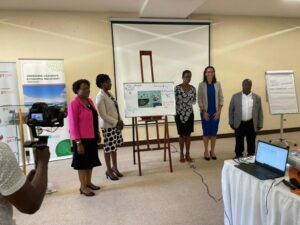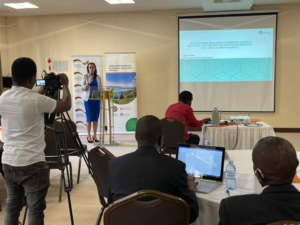Uganda’s economy is striving to emerge from the devastating impact of the COVID-19 (coronavirus) pandemic, but prospects for growth have been undermined by increasing pressure on its natural resources. On August 10th, 2022, the Ministry of Finance, Planning and Economic Development (MoFPED), the Ministry of Water and Environment (MWE), and the National Planning Authority (NPA) signed a commitment with development partners; GIZ Uganda, the United Nations Framework Convention on Climate Change (UNFCCC) Regional Collaboration Center (RCC) and the Global Green Growth Institute (GGGI) to support Uganda’s economic green growth objectives and climate change targets and build resilience to climate-related catastrophic events.
“Uganda is integrating climate resilience into its long-term strategy recovery to combat the economic slowdown. Over the years, we have put in place enabling frameworks that guide us to actualise our recovery plan, these include – the National Development Plan III, The Uganda-Green-Growth-Development-Strategy-2017, and The National Climate Change Act 2021”, shared Ms. Maris Wanyera, the Acting Director Debt and Cash Policy, MoFPED in her opening remarks. “It is imperative that we work with development partners to catalyze green financing that will see us move forward and triumph amidst the climate-related challenges that the country is facing. The COP 27 should prioritize climate financing and adaptation to guarantee social inclusive green growth,” She spoke.

MoFPED, CCD (MWE), NPA, GiZ and GGGI all expressing their commitments to the recovery plan
The Green Recovery Action Plan provides solutions to the combined challenges of the country’s COVID-19 recovery and climate change, by focusing on critical areas of joint priority, including climate finance, renewable energy, resilient agriculture, resilient cities, land use and biodiversity.
“There’s a need to accelerate investment in the green economy and GGGI is committed to supporting this cause. We are setting up structures and policy approaches for us as a country to be ready to trade in carbon markets including a climate finance unit at the Ministry of Finance,” said Ms. Dagmar Zwebe, the Country Representative, GGGI Uganda. “As GGGI, we are implementing several green projects ranging from climate-smart agriculture to greening Uganda’s cities and industrial sectors then to, waste and fecal sludge management. This is aimed at supporting Uganda fulfill her NDC commitments.

Ms. Dagmar Zwebe, GGGI Country Director, giving remarks at the launch
Mrs Margaret Mwebesa, the Commissioner of the Climate Change Department in MWE, said Uganda boasts of being the first country to launch a result-based partnership plan in 2018 and hold an economic advisory initiative regarding climate change in Africa. This is all aimed at ensuring the country’s readiness for Article 6.
Mr. Ronald Kaggwa from the National Planning Authority (NPA) conveyed the need to balance inclusive, clean and resilient economic recovery. “We need innovative ways of financing to reverse the impact of COVID-19 on the implementation of NDPIII. We need to mainstream green financing principles in all government focus areas to give the country a platform for mobilizing support for green funding. Uganda needs to mobilize $ 11 billion for a green recovery,” Mr. Kaggwa said as he appreciated the development partners’ efforts in supporting Uganda’s green economic recovery.
“Doing nothing is not an option. We need to be creative and innovative to mitigate the coronavirus’ economic disruptions on Uganda’s economy. We need to be innovative when it comes to climate financing to implement our NDC commitments as a country,” said Ms. Margaret Mwebesa while closing the event.
This dialogue was organized together with NDC Partnership, German Cooperation and the Global Green Growth Institute (GGGI).